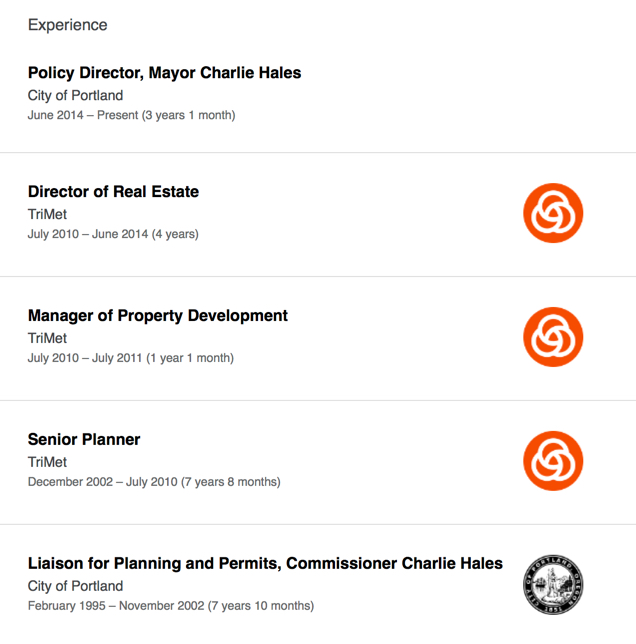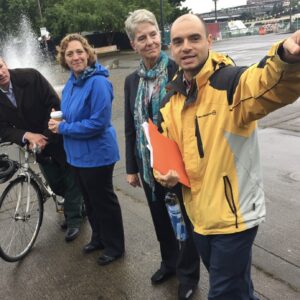
(Photo: The Street Trust)
Jillian Detweiler is the new leader of The Street Trust.
The 51-year-old northeast Portland resident who lives on the Going Street Neighborhood Greenway and tells us she “cheered” when its sharrows appeared in front of her house, is a new kind of leader for an organization in the midst of transformation.
Detweiler is currently the interim development manager for Prosper Portland (formerly the Portland Development Commission). Before that she served three years as a policy director for former Mayor Charlie Hales — her second stint on Hales’ team after working with him out of college in the mid 1990s.
After earning a Masters degree in city and regional planning from the University of North Carolina in 1992, Detweiler worked on planning and permit issues for then Commissioner Hales from 1995 to 2002. After that she spent 12 years at TriMet — first as a planner and then as director of real estate. In that position she oversaw $240 million in property acquisitions as part of the MAX Orange Line project.
With her background of city hall politics, transit planning, and high-profile development work, the selection of Detweiler reflects The Street Trust’s goal of becoming a political powerhouse with an expansive portfolio and the funding streams to make it all possible. She has no experience in professional bicycle activism, and that’s likely part of the reason she was hired (we heard from sources that The Street Trust favored candidates with more political experience).

In a statement released this morning The Street Trust Board Chair Justin Yuen said he expects Detweiler to, “Continue the transformation of The Street Trust into an organization that recognizes that the benefits of active transportation need to be shared equitably and serve people displaced from neighborhoods across the region.”
Here’s more from Yuen:
“The choices our region’s leaders and citizens make over the next few years will determine what kind of transportation system we use for the next several decade. State and regional agencies are considering billions of dollars of investment in transportation infrastructure right now — we want that infrastructure to make a major difference on streets in neighborhoods across the region… The Board and staff of The Street Trust remain deeply committed to the long-term vision of building a place that embraces biking, walking and transit not just for some, but for all those that call our region home.”
Detweiler takes over an organization with 15 paid staff and an annual budget of $1.3 million. With a recent change to their name and mission, and major staff turnover in the past few years, The Street Trust is desparately in need of stable leadership. Gerik Kransky, The Street Trust’s policy director, recently told us that his efforts to balance the interests of cycling and secure funding in the statewide transportation package is the “toughest political challenge” he has faced in his seven-year tenure.
Advertisement
I chatted with Detweiler on the phone yesterday. The Q & A below has been edited for clarity:
What part of town do you live in?
“I live on the Going Street bikeway around 41st and Alberta Court. I cheered when the sharrows appeared in front of my house! The bikeway is my regular route and I just love it. I remember when there were stop signs every other block and it was hard to make progress. It felt safer to ride at night because at least you could see headlights coming toward you. I just love it now! For me, personally, it’s one of the best accomplishments made during the Sam Adams administration.”
What’s your relationship to cycling?
“I have two bikes… I’m a multimodaler and usually I take transit. I worked for TriMet and felt I ought to be using the service I was working to provide. My route was the 75 bus to Hollywood transit center than I’d switch to the MAX.
I’m a little more of a fair weather bike rider. I ride my bike a lot for errands, seeing friends… But I’ve had jobs that require nice clothes and I can’t always manage the changing of the [cycling] costume in harsh weather. My husband rides in any weather. He’s a mountain climber; but I say the most dangerous thing my husband does is ride to work and it shouldn’t be that way.”
Why did you apply for The Street Trust job?
“I’m maybe not the only person who, post-Trump election, wants to double-down on efforts to make our society a better place. And for me, transportation has always been a passion. I view The Street Trust’s evolution as a move to become inclusive and to address the equity gaps we see in the city and that is very important work to me. I love the size of the organization. It’s had staying power [founded in 1990]. And I’m at a point in my career where I felt I wanted to step up and lead an organiztion. I felt incredibly lucky that just as I was reaching that point, this position was open.”
Would you have applied if they were still the Bicycle Transportation Alliance?
“Maybe not… I might have applied, but would not have gotten the job.
I think my experience speaks to the broader agenda. I’m not just transit-focused; but the way I’ve been able to bring it together with affordable housing, inclusive public processes and that broader agenda, also speaks to where I have some depth of relationships in the community that has ties to funding that could support the The Street Trust.”
What part of their mission is most exciting to you?
“I’m not quite there yet in terms of understanding everything they do. As ED [executive director], there are some wonderful people at the organization and the thing I’m most excited about is making sure they are supported with the resources they need and there is stable funding. I love the encouragement work they do. Learning about the Safe Routes to School Work and encountering classes where The Street Trust gets kids onto bikes for the first time — that makes me weepy!”
Is there a part of the transportation debate advocates are missing? And can you bring it to the table?
“While I was in [Mayor] Hales’ office we felt there was a kind of void for how much community organizations were present in city hall. I think there’s room to get more attention on bike transportation and other transportation needs.
I mean, sadly, we’ve had some difficult politics in the city post-Trump election, and those have taken up a lot of oxygen. Housing has taken up a lot of oxygen; but transportation is the second largest housing cost for most households and I think we can help policymakers and people that make decisions about public investments understand that making it possible for people walk and bike and take transit can have real economic benefits for them.”
What do you think is the biggest transportation issue facing the Portland region today?
“I put safety first. I don’t know if the Vision Zero moniker has caught on enough; but it feels like every morning… there’s… wasn’t there just another pedestrian fatality at 122nd and Division? So yes, safety.
I also hear a hunger — especially among my cyclist friends — for, what’s it going to take to get us to the next level? I would love to see more mobilization around separated bikeways. I don’t claim to know all the details of the feasibility of them; but a Sullivan’s Gulch bikeway sounds terrific because of how it could link in the Gateway area.”
There’s a debate in the community about The Street Trust’s shift toward a more conservative activism style in recent years. Where do you fall on the spectrum of advocacy style from grassroots rallies and marches on street corners, to behind-the-scenes relationship building and political lobbying?
“I believe short-term wins are really important to keeping people motivated and keeping spirits high of those who support us doing good work. It’s much harder to do that on the long-term policy and funding projects. I would hope to get the resources and staffing necessary to define some discreet, short-term improvements to make happen and then celebrate those victories.”
For many people, The Street Trust is still “the bike group”. How do you respond to people concerned that you don’t have any experience in bike advocacy?
“I think the bike culture is a really distinguishing feature of Portland and would like to see it extended to the region. I had the opportunity to travel with Mayor Hales, the mayor of Austin [Texas] and former US DOT Secretary Anthony Foxx to look at cycling culture in three Scandinavian cities… Cycling is a real passion of mine. Cycling may not be for everyone; but we’ve got to expand the number of people who feel safe to meet all their transportation needs. It’s the healthiest and cheapest ways to get around. I in no way want to diminish the importance of cycling.”
Anything else you want to share?
“I’m really excited! The work couldn’t be more important to me. When I saw the job posted, literally my heart just soared! And i’m really looking forward to all of the people I expect to meet and enlisting their support to achieve our goals.”
Detweiler is the first woman to lead The Street Trust since 2005. Her first day on the job is August 7th.
— Jonathan Maus: (503) 706-8804, @jonathan_maus on Twitter and jonathan@bikeportland.org
BikePortland is supported by the community (that means you!). Please become a subscriber or make a donation today.







Thanks for reading.
BikePortland has served this community with independent community journalism since 2005. We rely on subscriptions from readers like you to survive. Your financial support is vital in keeping this valuable resource alive and well.
Please subscribe today to strengthen and expand our work.
Best of luck Jullian! We all hope to be celebrating some successes with you soon. My advice would be to spend some time thinking about how the internet has changed activism in the city and build an organization that supports those changes. From the outside, an advocacy group is only as strong as it’s communication team. Spend lots of time talking to Jonathan, no one knows the intricacies of our city’s bike culture like him.
The street trust needs to be member driven and seek out diverse members and people who left the BTA after too many failures (cozy with big $$ and our oppressors)
I pay to support Jonathan. If the street trust keeps looking to male white “experts” they will loose more donors like me. The power is in the people not the media. ( even if the media is Jonathan)
See my post below for ways to rescue the street trust and #visionZero in PDX.
Welcome Jillian.
I’d love to hear your thoughts on Prosper Portland’s deep desire to build lots more expensive parking garages in our city.
One of my first thoughts as well.
I see a whole lot of: cycling is dangerous, cycling can’t be done except in perfect weather, cycling is for children. All untrue, but all accepted by far too many people.
The old BTA is truly gone; The Street Trust is a transit organization. I wish them well, but hope we don’t end up with the usual situation where transit and cycling fight each other for what little space and resources aren’t reserved for private cars.
“I see a whole lot of: cycling is dangerous, cycling can’t be done except in perfect weather, cycling is for children. All untrue, but all accepted by far too many people. …” b carfree
Untrue for who? Yourself and other dyed in the wool bike advocates? If so, I’m glad for you. Count your blessings.
For the many people realizing that biking is unable to serve as the mode of travel that can sufficiently meet their travel needs, serious biking advocates with a grip on reality must be able to conceive and work to accomplish improvements to biking infrastructure that can bring more of these people to support public investment in biking infrastructure.
Biking on much of the type of bike lanes available today, is dangerous, no mistake about that. At least some limited mileage of really good, superior central route biking infrastructure might be sufficient to induce more people to endure the often cold and wet riding conditions that characterize Oregon. Without that, unless it’s absolutely not an option, many people will drive or otherwise travel by motor vehicle instead.
Making some progress towards really good, superior central route biking infrastructure, and walking infrastructure, is something I hope an organization like Street Trust can help do.
I hope someone lets her know that the Sullivan’s Gulch Trail is a $100M+ project, adjacent to a freeway and freight line spewing out pollution, with poor access to destinations along the way, and relies on an impossible belief that Union Pacific will allow use of their right-of-way (they are adamantly opposed, in fact). That money would be much better spent on surface street improvements like protected bikeways on Broadway and Lloyd Blvd, and upgrades to Tillamook. In fact, in their last Blueprint the BTA dropped Sullivan’s Gulch in favor of the North Portland Greenway (which has its own challenges, but far more feasible and useful).
Yeah but what about east PDX residents? We need better east-west routes to the central city.
I agree Union Pacific is not a willing party at this time. The key to dealing with Union Pacific will be to link the City permitting expansion/upgrades of the their Brooklyn Yard with allowing the City access for the Sullivan’s Gulch Trail.
And especially unlikely now that they have to constantly deal with people camping/trespassing on their ROW. I’ve lived near that line for years, and there has been a noticeable uptick in campers, which causes the trains to blow their horns more often. It is bad enough this year that our neighbors have been calling the railroad in hopes that they will clear them out, since the city won’t do anything about it.
I would love to have a Sullivan’s Gulch trail, since it would cut my commute time to downtown in half. I just don’t see it happening in my lifetime.
Congrats to Jillian and The Street Trust!
Yeah! Another city hall insider…and this one worked for the awesome bike champion Charlie “Only Rides for Photo Ops” Hales. Add this to BTA / The Street Trust’s constant settling for a few crumbs in Salem and then trumpeting it as a “MAJOR VICTORY FOR PEOPLE CENTRIC TRANSPORTATION!!!” or whatever buzzwords are in vogue, and I am done with ***deleted by moderator, please tone it down Brad.***.
Face it, folks…the 2030 Bike Plan / 2040 Active and Lively Lanes Initiative / 2050 Just Like Utrecht Paths of Wonder Scheme is never happening. These guys and PBOT’s “advocrats” are “let’s study and then talk about it some more” do-nothings just passing the time until they receive a pension.
Why not give her a chance at least ? after all she and her husband do bike and thereby know what conditions are like for the rest of us.
Detweiler is an interesting choice for ED of The Street Trust. Seems like she definitely has a sense of how politics and bureaucracy works, which is essential to effectively applying muscle towards getting constructive things done..things that though they are increasingly essential in growing cities and communities, in many people’s minds are expendable when the money is tight.
What’s will be the first two or three, most important objectives for helping biking to be a better, more practical and enjoyable means to get around the city, she believes TST should put its energies to? In terms of projects or accomplishments. This is something I’ll be interested in hearing from her.
I expect TST will be closely monitoring plans for the coming Flanders St bike and pedestrian bridge, bringing in advice and requests for enhancing its ability to be an alternative to driving. If Detweiler could do something to move the city a little further along towards considering planning for a basic main lane separated cycle path system, that might be good too.
Regionally, there’s definitely a need, I think, for emphasis on planning and construction of seriously good connecting bike routes for practical, not just recreational travel, between cities and communities. To date, their provision occurs only over very long timelines, and in a very frustrating ‘catch as can’ manner. So, there’s too many abruptly ending bike lanes, continuing again, many feet away, or not at all, waiting for sections between to be connected when someone finally finds the money to get it done. Dealing with this reality, effectively, is something it sounds to me that Detweiler may have some experience with.
I’m a former BTA member who gave over $500 and many volunteer hours. Win us back please.
I quit because the BTA was passive on long and short term goals. Countless battles that would have been an easy win. This was not the agenda creep as staff claimed. The CRC freeway is just one big example. I’ll leave the other countless BTA blunders in the past.
Here are short term projects to win at near zero cost. These would win back me and thousands of donors/volunteers. Jillian is a fundraising expert ( Development Director ) who knows how to bring back donors like us.
1- Bus only lanes for the cost of paint and a few parking spots on arteries a few hours a day. Current funding for speeding up bus lines is $75,000 a year. ( I went to a meeting last night with PBOT) Compare that to 1/2 billion for the Moda Freeway expansion of one lane for 1/2 mile.
2- PBOT can issue DIY permits to citizens willing to fund safety projects. Zero cost. #demandMore #visionZeroDIY
3- Force TriMet to gut the failed route map for buses. Ridership % is down because we are stuck with routes made 30 years ago. Net increase in funds due to more ridership.
4- Stop using PCC grant funds to build parking lots at $25,000 per space. Give every PCC and PSU student a bus pass. Extend high school bus passes to include summer.
5- We demand extreme opposition to the billions wasted to widen freeways. Oppose the lies this project will reduce pollution and add safety. Stop the project, stop the lies.
6- Form a PAC affiliate. This is common in Seattle, SF and many cities. I’d donate to BOTH your PAC and the non PAC Street Trust. Let the members vote on what candidates and measures to support. This is done in San Francisco. Sometimes it’s ok if members disagree and no endorsement is made. This public vote informs everyone, and holds the candidate put in office accountable for decades. Portland transportation PACs have died because they are not member driven.
7- Hold PBOT and ODOT accountable. Demand more public meetings. We know things can’t happen overnight and exactly the way we want, but we want public input and transparency.
8- Make the street trust more transparent. Make your meetings less top down, more member driven and better accessible and publicized. Let volunteers do more than stuff envelopes with your agenda. Make it our agenda. Let people work together to delegate work and move top issues forward for both short/long term celebrations.
Please call (503) 226-0676 bring back members and save the Street Trust.
Sincerely, Joe Rowe
“…the Moda Freeway expansion of one lane for 1/2 mile. …” buildwithjoe
There’s no ” Moda Freeway”. You must be referring to I-5 as it passes adjacent to the Rose Quarter. It’s a lot of money to fix the bottleneck there, but Street Trust simply opposing fixing it without a viable alternative isn’t likely to be the kind of action that would win the organization much support from the majority of the population. And winning this kind of support is what Street Trust has got to do if it hopes to get much done.
I’m not sure that people having to travel by motor vehicle, feel their money spent on having freeway bottlenecks or congestion points fixed up, is a waste of their money. In the overall scheme of things, at present, it seems to me that infrastructure for travel by bike and mass transit, continues to be at best, secondary in importance to infrastructure for travel by motor vehicle. I wonder what Detweiler’s thoughts are on this.
I would give money to an organization which simply managed the day-to-day maintenance of bike routes, hound PBOT about small fixes, and petitions for bigger ones. e.g. The city won’t take complaints about state-owned roads, I don’t know if someone has reported the yet-again worn-off bike lane paint at a particular location, or what is being done to track and fix the problem spots. i.e. A cyclists’ union to do the job the city/state should be doing. They could even sell special license plates to raise money.
Congratulations, Jillian and Streets Trust Board!
Congrats Jillian! I hope Street Trust can come out squarely against the proposed state transportation package with its freeway expansion. I know you have not consumed the “kool aid” of adding lanes to urban freeways to relieve congestion. Sadly City Council has.
Jillian helped me with something back in the 90s. Every few years after that, I’d be getting the runaround with one agency or another, working my way up the chain until inevitably I’d make a call to the next level person and hear, “This is Jillian. Can I help you?” And she always did. So I think she’ll be great.
Meh. The BTA died long ago and it just took the board a few years to get the memo.
This is a totally different organization, focused on building political capital and choosing to work from the inside of a creaky, bloated political system. “Grassroots” does not exist in their vocabulary, and if they’re keen to work with orgs like Prosper Portland then neither will “inclusion”.